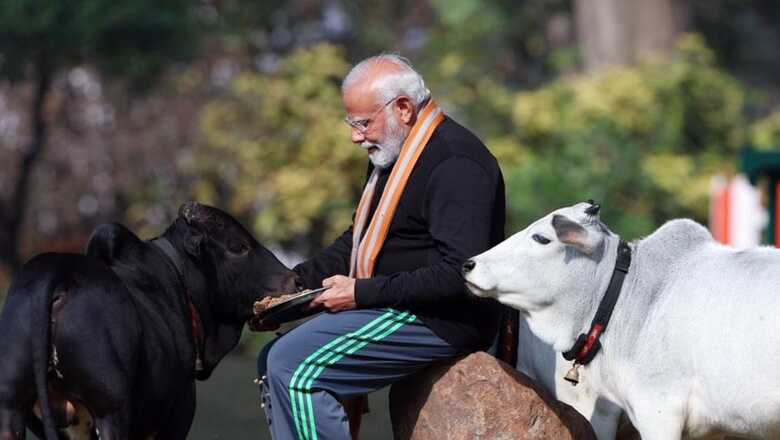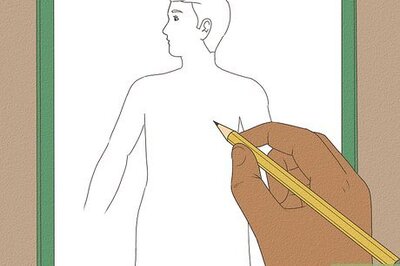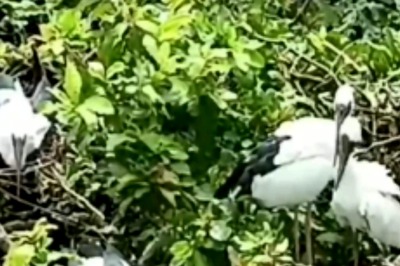
views
If you would like to breed Punganur cows at home, just like Prime Minister Narendra Modi does, it’s no longer a tough task. On the auspicious festival of Makara Sankranthi, PM Modi was seen feeding several Punganur cows at his residence in New Delhi.
This rare breed, native to a village by the same name in Andhra Pradesh, is diminutive — it can even be bred in an apartment. It is among the world’s most dwarf cattle breeds but yields highly nutritional milk, as explained by experts.
Dr BL Chidananda, a retired professor of Animal Sciences from the University of Agricultural Sciences, GKVK, calls the Punganur breed a ‘gold mine.’
“The milk of this cow also has the element Au, the chemical name for gold. Even today, many temples of Andhra Pradesh, including the famous Tirupati Thirumala Temple, use the milk of a Punganur cow for Ksheeraabhishekam (milk offering to the deity),” the expert told News18, adding that people use silver utensils and sometimes consume wafer-thin sheets of gold and silver to add nutritional value to their health.
“The milk a Punganur cow provides has high nutritional value. Known for its high-fat content A2 milk, rich in nutrients such as Omega fatty acids, calcium, potassium, and magnesium, which are essential for maintaining good health,” the animal sciences expert said.
A Punganur cow can give around 1 to 3 litres a day, and the milk fat content is 8 per cent as compared to 3 to 4 per cent in other native breeds.
The higher the value of the feed, good genetics, and maintenance, the better the quality of milk produced.
The Punganur cow breed looks beautiful and is considered ‘divine,’ with a special glow in its eyes and stride, say rearers of this rare breed. Docile in temperament and extremely friendly, it is a beautiful animal to have around children as pets, say experts, encouraging families to adopt Punganur cows in their homes.
To own a Punganur cow is a matter of prestige. The bovines are largely maintained in the farms of temples, goshalas, and homes of rich landowners. They can cost anywhere between Rs 1 lakh and Rs 10 lakh, say farmers, depending on the purity of the breed and the health of the cow.
Amongst Hindus, it is believed to be sacred to keep cows as they symbolise prosperity and compassion, and bring good fortune to homes. Punganur cows, once facing extinction, have seen an increase in numbers due to the project Mission Punganur. According to a veterinarian, most of the cows at the prime minister’s residence belong to this variety.
“In our culture, cows are revered as our holy mother. She is a provider, one who feeds a home. She is treated with utmost respect and is a symbol of purity, love, and warmth. Punganur cows, though small, are a powerhouse of these qualities, making them extra special,” said Ramesh Krishna, a farmer from Chittoor who has a dairy farm with this breed.
This breed faced the threat of extinction at one point when farmers began to push the cattle for more milk, one it could not provide compared to the amount that hybrid cows did. Suddenly, Punganur cattle were seen as a liability, and farmers began to sell them off or abandon them.
Massive efforts were made to revive the breed whose numbers had dropped to a dismal 100 in the country. The Andhra government also embarked on a mission to revive their population and in 2020 launched Mission Punganur to popularise it and conservation. The postal department also released a special cover on Punganur cow as part of the conservation drive.
The PMO, in an effort to be a part of this conservation drive, has been rearing a group of them, said a veterinarian expert from AP. Efforts are also being made by agri-scientists to promote embryo transfer to help in conserving and safeguarding the breed.



















Comments
0 comment